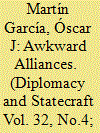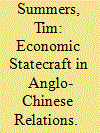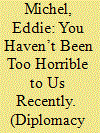|
|
|
Sort Order |
|
|
|
Items / Page
|
|
|
|
|
|
|
| Srl | Item |
| 1 |
ID:
183156


|
|
|
|
|
| Summary/Abstract |
A body of literature on Cold War international history has studied the influence of modernisation theory in United States foreign relations with its authoritarian allies in the Third World during the 1950s and 1960s. However, this area of research has been much less interested in those Washington-friendlydictatorships that, as in the case of Francisco Franco’s regime in Spain, do not fit into the Third World analytical framework. This analysis assesses the contribution of modernisations doctrine principles to American foreign policy towards the Spanish dictatorship in the 1960s and considers how this theory provided the conceptual tools to justify the American collaboration with the Franco regime in the name of development, security, and long-term democratisation. It examines the role of modernisation as, on one hand, an interpretative framework for Spain’s economic and social evolution during that decade and, on the other, an instument of political legitimisation serving American strategic interests. In this way, this work sheds light on the ideological and intellectual underpinnings of the American alliance with the Franco dictatorship in a period of great challenges and transformations in Spain.
|
|
|
|
|
|
|
|
|
|
|
|
|
|
|
|
| 2 |
ID:
183159


|
|
|
|
|
| Summary/Abstract |
This analysis demonstrates the use of economic statecraft in Anglo-Chinese negotiations over a new airport for Hong Kong. Leading to the signing of a memorandum of understanding in 1991, Chinese negotiators used bargaining leverage to withhold support for the airport and related projects to obtain British agreement for ‘consultation’ over major projects that straddled the transfer of sovereignty in 1997. Subsequent British flexibility on the timing of the project’s completion meant that Chinese attempts to use leverage on the airport in further talks after 1992 were somewhat less effective. Nevertheless, wider difficulties in the bilateral relationship and the legacy of distrust slowed detailed negotiations over airport financing, with the final pieces only put in place in 1995. Based on the perceptions of negotiators on both sides, there existed a tendency for each side to see their negotiating position as reasonable and justified, and the other as duplicitous or unreliable.
|
|
|
|
|
|
|
|
|
|
|
|
|
|
|
|
| 3 |
ID:
183158


|
|
|
|
|
| Summary/Abstract |
Although German Federal Chancellor Helmut Kohl and British Prime Minister Margaret Thatcher were on the same side in the Cold War, as well as in the same family of moderate centre-right parties, despite being roughly the same age and sharing a fundamental market-economic and Atlanticist orientation, they were not in harmony emotionally. This analysis demonstrates how different genders, incompatible conceptions of nation, history, and regional origins, as well as experiences of mutual frustration eclipsed their ideological commonalities and counteracted against the ‘emotional regimes’ of ‘the West’ in the Cold War. It breaks new ground in several respects. First, it does not examine strong feelings that blotted out all others but rather a range of more ambivalent and nuanced emotions. Second, it links the themes of gender and feeling by enquiring about the male or female manifestations and attributions of certain emotions. Third, it focuses on not only men and women at the top but considers their entourages as either amplifiers or ‘shock absorbers’ of the leaders’ feelings. Finally, it explores the scope and limits of the notion that the Cold War was an ‘emotional regime’.
|
|
|
|
|
|
|
|
|
|
|
|
|
|
|
|
| 4 |
ID:
183161


|
|
|
|
|
| Summary/Abstract |
This analysis unveils the convergence of the International Federation of Association Football’s [FIFA] football reunification initiatives and the interests of global actors with an interest in solving the Cyprus problem. In 2013, at FIFA’s headquarters in Zurich, Turkish-Cypriot and Greek-Cypriot football officials signed a historic provisional agreement to reunite the two communities in football. That prospect might also act as a catalyst towards the island’s political unification, and for that reason, it was welcomed by global actors for different reasons. For some, hydrocarbon exploration licencing by a united government of Cyprus would not be questioned. However, those loyal to Turkey and the Turkish-Cypriot political elite managed to thwart FIFA’s initiative to serve Turkey’s goals as a regional Power, that is, solve the Cyprus problem on its own terms and assume a role in the hydrocarbon regime in the Eastern Mediterranean.
|
|
|
|
|
|
|
|
|
|
|
|
|
|
|
|
| 5 |
ID:
183155


|
|
|
|
|
| Summary/Abstract |
The Soviet experience of the Second World War is not commonly associated with popular activism in foreign relations. Yet, throughout the war, the Stalinist regime actively engaged in soft power projects with its allies, one of which was a pen-friendship scheme involving thousands of ordinary individuals. This analysis examines Anglo-Soviet popular correspondence amongst young people and children as one of the earliest examples of ‘citizen diplomacy’. It examines the function of international exchanges as instruments of both state policy and personal interaction, arguing that this penpalship was not mere propaganda manipulation. Undoubtedly brokered to achieve certain goals, it also had an element of spontaneity and sincerity, springing from a real popular feeling. Delving into the inner-workings of Soviet propaganda and diplomatic machinery, this article exlpores the significance, complexities, and limitations of the wartime epistolary exchange amongst the young.
|
|
|
|
|
|
|
|
|
|
|
|
|
|
|
|
| 6 |
ID:
183154


|
|
|
|
|
| Summary/Abstract |
The 1923 Treaty of Lausanne has been the most consequential treaty for the Eastern Mediterranean during the past century. It established the borders of the newly founded Republic of Turkey and defined its relations with Cyprus. Yet, a provision of the treaty has escaped scholarly scrutiny. This analysis explores the violation of Lausanne’s Article 21 that provided for emigration of Moslem Cypriots to Turkey by British Imperial officials in Cyprus. There are three significant issues about Moslem Cypriots acquiring Turkish citizenship. First, it demonstrated the newly formed Turkish Republic’s stance towards the Moslem community of the former Ottoman Empire. Second, it underlined the aspiration of a large portion of Moslem Cypriots to join newly formed Turkey. Third, and most important, it upheld British Imperial strategy on the island and the significance of the continuation of the existence of a Moslem minority. The value of the Lausanne treaty for Cyprus and the relationship between the British rule and the Moslem community of the island was paramount.
|
|
|
|
|
|
|
|
|
|
|
|
|
|
|
|
| 7 |
ID:
183153


|
|
|
|
|
| Summary/Abstract |
Contemporary power politics often takes place in liberal fora, yet scholars have not paid sustained attention to the origins and characteristics of this mode of statecraft. To trace the development of these repertoires, the negotiation practices of the 1899 and 1907 Hague conferences represent a critical transition from realist practices of the Concert system to twentieth-century liberal internationalism. At The Hague, states experimented with using parliamentary procedure: they introduced motions, held votes, signed and ratified agreements. The Hague conferences were also an occasion where states grappled with questions of institutional design. More broadly, the conferences were a moment when states appealed to concepts of public opinion, international society, and “civilisation” to legitimise change. The methods that diplomats developed for managing tensions within and amongst these repertoires remain a familiar feature of liberal statecraft until the present day.
|
|
|
|
|
|
|
|
|
|
|
|
|
|
|
|
| 8 |
ID:
183152


|
|
|
|
|
| Summary/Abstract |
This analysis examines the British government’s failure to commit adequate resources to defend the Netherlands from the threat of revolutionary France in the campaigns of 1793, 1794, and 1795. Alongside well-known military and diplomatic setbacks, the inadequacy of Britain’s engagement remains best understood by examining ministers’ preconceptions of the Netherlands and Dutch national character. These understandings largely derived from British public opinion concerning the Netherlands. The analysis shows that British perceptions of Dutch strength, wealth, and national character led ministers to presume too much of their ally and contributed to limiting their own commitments.
|
|
|
|
|
|
|
|
|
|
|
|
|
|
|
|
| 9 |
ID:
183160


|
|
|
|
|
| Summary/Abstract |
How best to understand South Korea’s engagement policy towards North Korea? Has it been interpreted correctly and untainted by the current political cleavage between different ideological blocs? Given that Kim Dae-jung, the South Korean president from 1998 to 2003, is widely regarded as the archetype of the engagement policy, this analysis re-evaluates his approach by examining his presidential speeches where three concepts emerge from a critical discourse analysis: securitisation, globalisation, and humanisation. This analysis argues that when it comes to evaluating this engagement policy, these concepts need greater comprehensive consideration. This analysis not only shows the necessity of synchronic policy analysis, it also offers an opportunity to reflect diachronically on the ways in which Kim’s engagement discourse was later adopted by politicians across the political spectrum that deal with North Korea. This is important to consider because his discourse continues to shape the inter-Korean negotiation process.
|
|
|
|
|
|
|
|
|
|
|
|
|
|
|
|
| 10 |
ID:
183157


|
|
|
|
|
| Summary/Abstract |
This analysis explores the efforts of the Lyndon Johnson Administration, for both moral and pragmatic reasons, to distance itself from apartheid South Africa during the 1960s. By 1964, the bilateral relationship with Pretoria was becoming a diplomatic liability for the White House. The international community, especially newly independent Afro-Asian states, was increasingly vocal in condemning South Africa, and domestically, the United States was seeking to remove the legacy of racial discrimination from its own society. Washington’s close economic and strategic ties to Pretoria, however, made taking a tough line with South Africa and broader disengagement from the apartheid state a difficult balancing act.
|
|
|
|
|
|
|
|
|
|
|
|
|
|
|
|
|
|
|
|
|